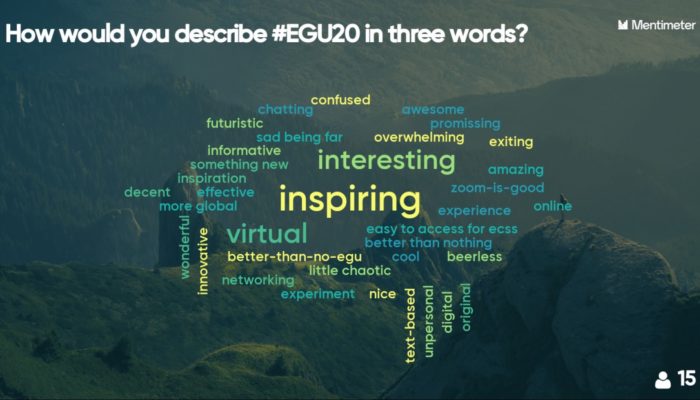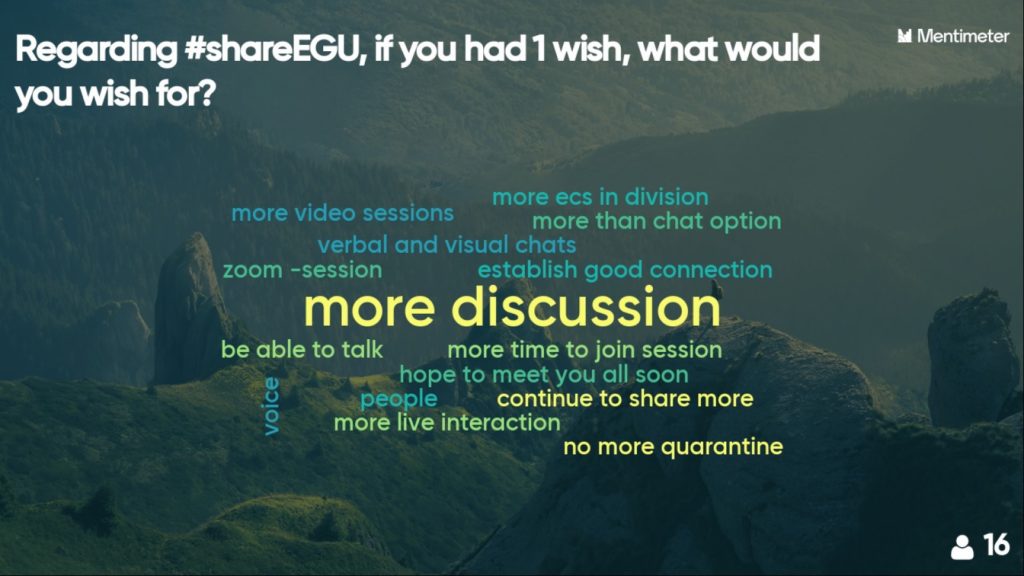
It’s 2020 and a new coronavirus has spread all over the world-changing most if not all our habits. In a few weeks, we’ve seen adaptations to living in a world with this pandemic, from many points of view. Science reacted and adapted very quickly, sharing research and opening dialogues using online tools. Similarly, the EGU General Assembly that usually hosts every year around 15,000 people in research activities, presentations and courses, this year has been hosted online. In less than 6 weeks the EGU General Assembly 2020 was transformed from an on-site conference to an on-line event open for everyone and free of charge: the participation of 26,000 attendants into its digital version represents a great success! The success speaks with numbers: 26,000 attendants from 134 countries, 701 scientific sessions, 18,000 abstracts and 63% of them with online shared material.
How did it work exactly? With no more distinction between oral, posters and PICO presentations, all authors were invited to upload research material to accompany their abstracts with universally accessible format and size. During the week, the classic scientific sessions were run instead on text-based chats to maximize accessibility, networking and interaction among researchers. All the uploaded material is available for comment until the 31st of May 2020 on the EGUsphere! Great Debates and Union Symposia were live video conferences, while a selection of Short Courses was pre-recorded and streamed online on YouTube. Most of the video material is available for re-watching here. And let’s not forget virtual receptions for networking.
But let’s see what are the opinions of the Natural Hazards Blog Team on #shareEGU:
“Being involved in some preparations and then attending the very first of a kind EGU virtual General Assembly has been an interesting and at times overwhelming experience. I did not honestly imagine that there would be so much participation and I’m very glad about the result and the perspective that we have a successful alternative, and a green one, for future need. It has been the very first experience of such a conference going completely digital and in a very short time. Due to the latter, the preparation time involved has been, at least for me, more and more tiring than that of a classical in-person conference. However, I think that if needed again in the future, we have now a great structure to start and improve from. My favourite thing? The fact that there are now more useful material shared and available online, like for example the short courses, and that they will stay available forever (if that even exists). My least favourite thing? Chat at time hard to follow and too short time for each presentation. What I missed the most from the physical GA? Meeting people and friends and the convener’s party! And I know you missed it too, don’t lie!“ – Valeria Cigala
“Participating in the EGU Virtual General Assembly (GA) from Japan has been difficult. I can imagine the same frustration of ‘overseas-attendees’ who missed many chats, streaming events and receptions because of the time lag. Nevertheless, I am really happy that it took place. I could interact virtually with some researchers on my field and learn a lot from the materials some others uploaded. Having the possibility to share my research and keep co-convening a Union Symposia in streaming cheered me up in this difficult period where (research speaking) a lot of events have been cancelled, some in-field data collection postponed and put some struggles to home office writing spirit. I feel that we can learn a lot from this online format and take some activities even for future GAs, like the uploaded material, the recorded short courses and the discussion comments available after the GA. Maybe next year, we’ll have the possibility to take the best from the two formats, because as Valeria said, I missed a lot of human connections and convener’s party as well!” – Giulia Roder

Thoughts of the participants to the NH Division ECS Virtual Reception on Zoom hosted during the #shareEGU20 week.
“As a participant from Europe, I did not have any problems with the time zone. I found the format interesting with a lot of pros. The main one is that I could follow as many contributions I liked with major time flexibility and less stress than that I feel when attending the physical assembly. Indeed, through the online version, I could comment author’s contribution even after the scheduled time. Furthermore, some of them also have the oral speech recorded on the slides thus it was almost like attending a live presentation! Other pros are the lower economic costs for the participants, the energy-saving as well as the lower paper consumption. Of course there still some open issues. I would add more video discussion to make feel people more involved and the discussion more empathic. Further, digital privacy and security aspects are always to be kept under careful surveillance. Nevertheless, I think that in general this experiment worked well and that can be proposed even in the future in combination with the classical physical assembly.” – Gabriele Amato
“The cancellation of the General Assembly this year, due to the Covid-19 pandemic, would have been a great disappointment and I am pleased that EGU managed to organise the Sharing Geoscience Online in such a short time. The virtual event enabled the free sharing of scientific knowledge and provided various learning and networking opportunities and I was excited that I could access uploaded presentation material in my own time. However, I did miss the live interactions during the sessions; it is always good to be able to see the reactions of the audience during the oral presentations. Also, in some sessions, during the live chat, it was difficult to follow the different discussions taking place at the same time and in some cases, there was not sufficient time for the author to provide a proper response. Maybe a combination of face-to-face sessions with some virtual content could support a greener approach in the future…” – Asimina Voskaki
And you?
What are your thoughts about the #shareEGU20 experience? We would really like to hear from you, leave us a comment below this post or even better take 5-10 minutes to complete the EGU 2020 questionnaire by 31 May 2020. Your input is very helpful for shaping future EGU General Assemblies and possible virtual extensions!

Joana Rodrigues
Despite the lack of more informal contact between colleagues (irreplaceable!) #shareEGU20 allowed me, for example, to peek in sessions that in other situations I would not attend. With fewer distractions, EGU20 online allowed me to focus more on each presentation – immediately go to references and other works, organize notes, contacts and ideas. The closing ceremony was memorable! To see so many people sharing the moment from their homes, with such an interesting and fun program (I confess that I shivered in a few moments)!
The platform and all the organization was very intuitive, with enough information and great technical support.
I had been postponing participation in the EGU Assembly for years, but the current sad situation and the online solution did not give me excuse to miss it. I hope to be able to go to EGU in Austria as soon as possible!
Vale Cigala
Thank you, Joana, for sharing with us your feedback!